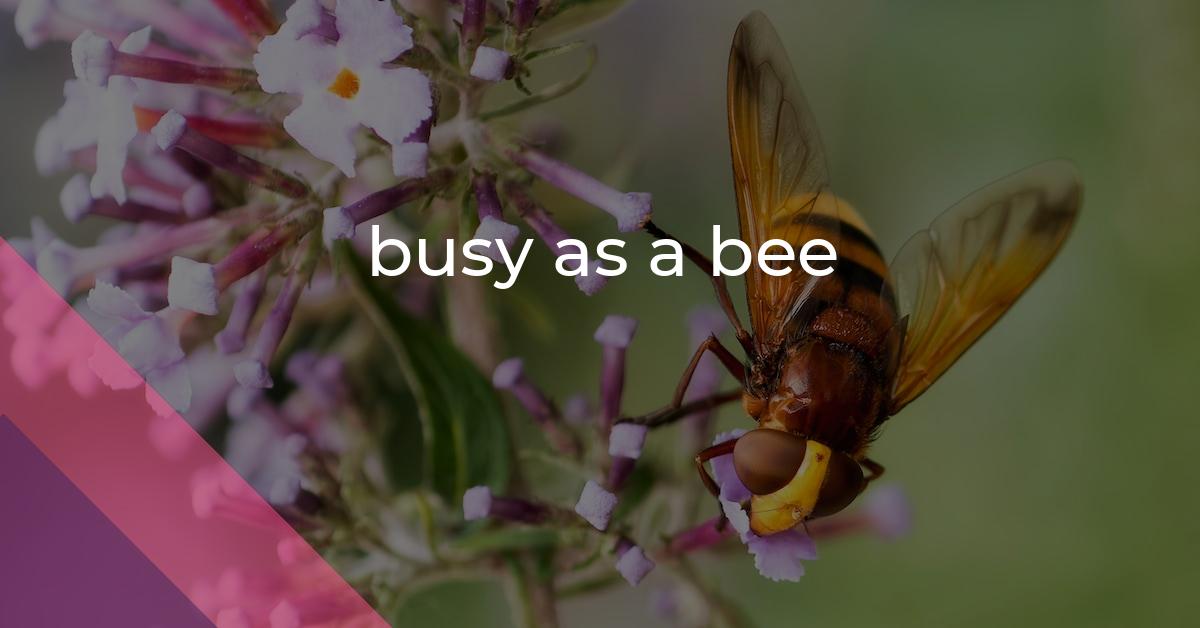busy as a bee: Idiom Meaning and Origin
What does ‘busy as a bee’ mean?
An idiom meaning very busy or actively engaged in activity, likening someone to a bee, known for its constant motion and productivity.

Idiom Explorer
The idiom "on the go" means to be busy or occupied with various activities or tasks, without much time for rest or relaxation.
The idiom "eat, breathe, and sleep" means to be completely consumed or obsessed with something, to the point where it becomes an essential and constant part of one's life.
An eager beaver is someone who is very enthusiastic and eager to work or help. They are known for their high energy and eagerness to take on tasks and get things done.
The idiom "day in, day out" means consistently or without interruption, typically referring to a repetitive or monotonous daily routine or task.
The idiom "daily grind" refers to the everyday routine or monotonous tasks of one's job or life.
The idiom "come to life" means to suddenly become active or animated, often referring to an inanimate object or a previously dull situation. It signifies a lively transformation or a sudden burst of energy, making something more vibrant and engaging.
The idiom "come alive" means to become animated, energetic, or lively, often after a period of inactivity or dullness. It is used to describe someone or something that suddenly becomes vibrant or full of life.
The idiom "caught up" means to become deeply involved in or affected by something, often to the extent of being overwhelmed or consumed by it.
The idiom "catch flies" means to do something unproductive or idle, often in a way that suggests a lack of focus or concentration on important tasks.
Symbolic Surprises Behind Bee-like Bustle
The idiom "busy as a bee" is a well-known phrase that has been in use since at least the early 18th century. It describes someone who is constantly occupied or working hard, often in a diligent and industrious manner. The origin of this idiom can be found in the behavior and characteristics of bees, particularly honey bees. Bees are widely recognized for their constant activity, diligently gathering nectar, pollinating flowers, and maintaining the hive. They have a highly organized social structure, with each bee having a specific role and responsibilities, exemplifying industry and productivity.
The metaphorical use of "busy as a bee" to describe human activity can be found in literary works dating back centuries. For example, in Shakespeare's play Henry VI, Part 1, the character Joan la Pucelle says, "She is more bonny than the bird of l'Almaine, / Though he be painted one way like a bee." This reference highlights the idea of busyness and activity associated with bees.
The idiom "busy as a bee" has become deeply ingrained in the English language, with its usage extending to various contexts. It is often used to praise individuals who are diligent, hardworking, and highly productive. The phrase can be employed to describe someone's work ethic, dedication to their tasks, or simply their ability to multitask efficiently.
Furthermore, "busy as a bee" is not only used in professional environments but also in everyday conversations. People often use this idiom to describe themselves or others who are constantly engaged in various activities or responsibilities. In this sense, the phrase captures the essence of a hectic and fast-paced lifestyle.
Being "busy as a bee" implies a lack of leisure time or an intense workload that leaves little room for rest. However, in many cases, the phrase is still used as a compliment rather than a complaint. It signifies a person's industriousness and dedication to their tasks, highlighting their ability to stay focused and productive.
The idiom "on the go" is another phrase commonly used to describe a person who is constantly busy or occupied. It shares a similar meaning with "busy as a bee," emphasizing the fast-paced nature of someone's activities or lifestyle. Just like bees that are always in motion, individuals who are "on the go" are constantly moving, multitasking, and engaging in various tasks or responsibilities.
Similarly, the idiom "busy as a nailer" is used to describe someone who is extremely busy or occupied. It suggests that the person is constantly hammering away at their work, just like a nailer who is continuously working on projects. The phrase "busy as a nailer" implies a high level of productivity and dedication.
On the other hand, "busy work" refers to tasks or activities that keep a person busy but do not necessarily contribute to their overall productivity or goals. It often implies work that is repetitive, menial, or unnecessary. While bees are known for their diligent work ethic, busy work is the opposite, representing tasks that do not lead to significant accomplishments.
When someone has a "bee in their bonnet," it means they are preoccupied or obsessed with a particular idea, topic, or issue. The phrase suggests that the person's mind is buzzing with thoughts and they are unable to focus on anything else. This idiom portrays a mental state similar to a bee buzzing around inside a bonnet, causing distraction and fixation.
Lastly, "bogged down" is a phrase used to describe a person who is overwhelmed or stuck in a difficult or time-consuming task. It conveys the sense of being slowed down or hindered by the workload or complexity of the situation. Just as bees can get stuck in sticky substances like honey, individuals who are "bogged down" find themselves trapped or hindered by their responsibilities or circumstances.
The idiom "busy as a bee" draws its meaning from the tireless and industrious nature of bees. It has been used for centuries to describe individuals who are constantly occupied and diligently working. The phrase has become a common expression in the English language, encompassing a wide range of contexts and connotations. From praising hardworking individuals to describing a fast-paced lifestyle, "busy as a bee" continues to be a relevant idiom that captures the essence of human activity and productivity.
Example usage
Examples of how the idiom "busy as a bee" can be used in a sentence:
- She was busy as a bee, juggling multiple tasks at work while also managing her personal life.
- During the holiday season, the shopping mall was as busy as a bee with customers rushing to buy gifts.
- The students were busy as bees, studying for their final exams and completing various assignments.
The idiom "busy as a bee" is commonly used to describe someone who is very busy or actively engaged in a task or multiple tasks. It implies a high level of productivity and constant activity, similar to the behavior of bees in a hive. The idiom can be applied to various contexts such as work, shopping, or studying, highlighting the busyness and buzzing energy of the person or environment being described.
More "Animals" idioms



